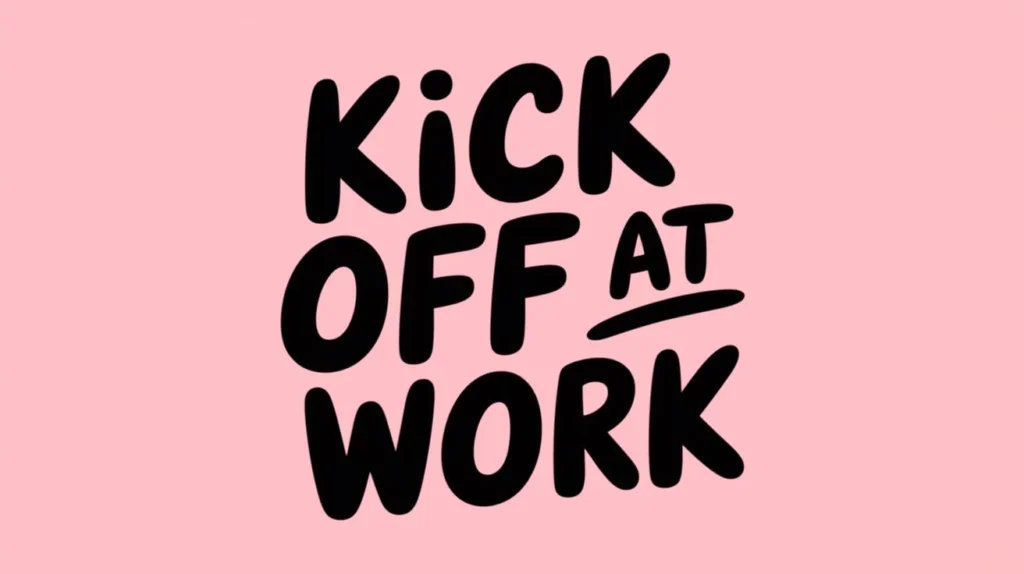Sometimes, we find ourselves in situations at work where someone is pushing too hard, crossing boundaries, or simply invading our space. It’s important to express our feelings in a way that’s both respectful and clear. Finding the right words can be tricky, but it’s also an opportunity to communicate your needs thoughtfully.
In this article, we’ll explore 20 ways to politely and effectively say “back off at work”, with examples and tips on how to make your message feel more personal and meaningful.
What Does “Back Off at Work” Mean?
When we say “back off at work”, we’re usually telling someone to give us more space—whether it’s physically, emotionally, or professionally. It’s a way of saying, “Please respect my boundaries,” without being overly harsh. We might use it when a colleague is being too persistent, asking for too much, or intruding on our personal or professional space.
This phrase can feel blunt or even aggressive, depending on the situation. But, sometimes, you need to stand up for yourself, right? The key is to choose words that allow you to express your need for space without sounding rude. In this article, we’ll offer gentler alternatives that preserve your professional relationships while still making it clear that you need some room.
Is It Professional/Polite to Say ‘Back Off at Work’?
Let’s be real—“back off at work” is not exactly the most polite thing to say in a professional setting. It can come off as harsh, and let’s face it, nobody wants to sound like they’re about to start a confrontation at work. But sometimes, we really need a way to set clear boundaries with our coworkers.
That being said, it is possible to communicate the same message in a more polite and professional way. Expressing your feelings doesn’t have to be done with a sharp tone. Finding the right balance of firmness and friendliness can help you get your point across without causing unnecessary tension.
Pros and Cons of Saying ‘Back Off at Work’

Before we jump into the 20 alternatives, let’s take a minute to weigh the pros and cons of saying “back off” at work.
Pros:
- Direct and Clear: It leaves little room for misunderstanding.
- Quick to the Point: You can instantly express your need for personal space.
Cons:
- Could Be Too Abrupt: It can sound harsh and might damage your relationship with a colleague.
- Possible Tension: It could lead to feelings of resentment or awkwardness.
Synonyms for ‘Back Off at Work’
- “I Need Some Space Right Now”
- “Can We Catch Up Later?”
- “I’m a Little Swamped Right Now”
- “I’m Trying to Stay Focused Right Now”
- “Let’s Put a Pin in This for Now”
- “I’m on a Tight Deadline Right Now”
- “Let’s Take a Break From This for Now”
- “I Need Some Quiet Time to Focus”
- “I’m in the Middle of Something Right Now”
- “Can You Give Me a Little Time to Think?”
- “I Need to Focus on This Task Right Now”
- “Let’s Revisit This After I’m Done”
- “I Need to Wrap Up a Few Things First”
- “Can We Take a Rain Check on This?”
- “I’m in a Deep Focus Zone Right Now”
- “I Need to Prioritize This Right Now”
- “I’m Currently in the Middle of a Meeting”
- “I’m Just Trying to Keep My Head Above Water Right Now”
- “I’m Not Able to Give This My Full Attention Right Now”
- “I’m Going to Step Away for a Bit”
1. “I Need Some Space Right Now”
Sometimes, all you need is a little space to focus or regroup. This phrase is straightforward, yet polite. It lets the other person know that you need a break without sounding harsh.
Scenario Example:
“Hi [Name],
I hope you’re doing well. I just wanted to let you know that I need some space for the next hour to focus on my work. I’ll be happy to chat once I’m finished. Thanks for understanding!”
Best Use:
When you need time alone to focus on work.
Additional Note:
Using the word “right now” adds a sense of urgency but remains calm and professional.
2. “Can We Catch Up Later?”
This phrase is gentle and implies that you’re not dismissing the person entirely. It’s like saying, “I’m busy now, but let’s reconnect soon!”
Scenario Example:
“Hi [Name],
Thanks for reaching out! Can we catch up later today? I’ve got a few tasks that I need to focus on first. Let me know when works for you. Best, [Your Name]”
Best Use:
When you want to postpone a conversation, without completely shutting it down.
Additional Note:
This option gives you time to gather your thoughts and set a better time for the conversation.
3. “I’m a Little Swamped Right Now”
This one plays into the universal experience of being busy. It’s a nice way to signal that you don’t have the capacity for a conversation or interaction at the moment.
Scenario Example:
“Hi [Name],
I just wanted to let you know that I’m a little swamped with deadlines at the moment. Can we touch base in a few hours? Thanks!”
Best Use:
When you’re overwhelmed with work and need to postpone or avoid interaction.
Additional Note:
This phrase acknowledges your workload without sounding defensive. It helps create understanding from the other person.
4. “I’m Trying to Stay Focused Right Now”
This is a subtle way to tell someone that you need to concentrate. It conveys that you need a bit of peace and quiet without being dismissive.
Scenario Example:
“Hey [Name],
I’m really trying to stay focused right now to get through this task. I’ll be free to chat in about an hour. Thanks for understanding!”
Best Use:
When you want to avoid distractions while still being polite.
Additional Note:
Letting the person know when you’ll be available for a chat gives them a sense of when they can expect to talk to you.
5. “Let’s Put a Pin in This for Now”
This phrase tells someone you don’t have the bandwidth to engage, but it doesn’t entirely shut down the conversation. It gives the impression that you’ll revisit it later.
Scenario Example:
“Hi [Name],
I think we’re getting a bit off track here. Let’s put a pin in this for now, and we can revisit it after I finish my current task. I’ll reach out later today. Thanks!”
Best Use:
When you want to acknowledge the conversation but can’t engage at the moment.
Additional Note:
This helps maintain a sense of politeness and professionalism while setting clear boundaries.
6. “I’m on a Tight Deadline Right Now”
Another way to politely express the need for space, this phrase suggests that you’re working under pressure and need to prioritize your tasks.
Scenario Example:
“Hey [Name],
I’m on a tight deadline right now and really need to stay focused. I’ll reach out when I’m free. Thanks for your patience!”
Best Use:
When you’re on a time crunch and need people to understand that your attention is already divided.
Additional Note:
This is a good option when you need the person to understand that it’s not personal; it’s just about your current priorities.
7. “Let’s Take a Break From This for Now”
This one is great if you’re in a conversation that’s dragging or needs to be paused. It’s not about cutting things off completely but taking a step back to reflect.
Scenario Example:
“Hi [Name],
Let’s take a break from this for now, and we can touch base again in a few hours once I’ve had time to think. Appreciate your patience!”
Best Use:
When a conversation is getting long or tiring and you need a moment to reset.
Additional Note:
This is a great way to say, “I’m not ignoring you, I just need a breather.”
8. “I Need Some Quiet Time to Focus”
Perfect for situations when you need to concentrate, this option is kind and makes it clear that your need for space is about focusing, not rejecting the other person.
Scenario Example:
“Hey [Name],
I need some quiet time to focus on this report, but I’ll get back to you later. Thanks for understanding!”
Best Use:
When you’re in a deep work session and need a break from interruptions.
Additional Note:
It emphasizes the need for focus and doesn’t come off as negative.
9. “I’m in the Middle of Something Right Now”
This is another soft way to indicate you’re busy without sounding dismissive. It’s a clear yet non-confrontational way of saying, “I need some space to finish this.”
Scenario Example:
“Hi [Name],
I’m in the middle of something right now, but I’ll reach out once I’m done. Thanks for your patience!”
Best Use:
When you’re already engaged in a task and can’t afford to be distracted.
Additional Note:
This keeps the tone neutral while still getting your point across.
10. “Can You Give Me a Little Time to Think?”
This phrase politely requests space and gives the other person a sense that you’ll come back to them once you’ve had time to process.
Scenario Example:
“Hi [Name],
Can you give me a little time to think about this? I’ll get back to you after I’ve had a chance to process everything. Thanks!”
Best Use:
When you need a pause to think and don’t want to feel rushed.
Additional Note:
This makes it clear that you’re not avoiding them, just giving yourself time to reflect.
11. “I Need to Focus on This Task Right Now”
Sometimes, you just need a straightforward way to communicate that your attention is needed elsewhere. This phrase lets people know you’re busy without being dismissive.
Scenario Example:
“Hi [Name],
I’m currently working on a task that requires my full attention. I’ll check in with you later when I’m available. Thanks for understanding!”
Best Use:
When you’re in the middle of a high-priority task and can’t afford distractions.
Additional Note:
This option keeps things polite and professional, while making it clear that you need uninterrupted focus.
12. “Let’s Revisit This After I’m Done”
A friendly, non-confrontational way to say, “I can’t deal with this right now.” This phrase implies you’ll return to the conversation once you’ve finished what’s at hand.
Scenario Example:
“Hi [Name],
Can we revisit this after I’m done with my current tasks? I’d love to give you my full attention when I can. Thanks for your patience!”
Best Use:
When you don’t want to rush the conversation and need time to give it your full attention later.
Additional Note:
This is a great option for colleagues who might be pressing you for an immediate response. It’s respectful while maintaining clear boundaries.
13. “I Need to Wrap Up a Few Things First”
This phrase communicates that you’re not avoiding the conversation but have other priorities that need attention before you can engage.
Scenario Example:
“Hi [Name],
I need to wrap up a few things first, but I’ll be happy to discuss this in a little while. Thanks for your patience!”
Best Use:
When you have a few loose ends to finish before you can focus on the conversation at hand.
Additional Note:
It’s a soft way to let someone know that their request is important but doesn’t need your immediate attention.
14. “Can We Take a Rain Check on This?”
A friendly way of saying “not right now” without being too formal or harsh. It’s lighthearted and conveys that you’re interested but just need a little more time.
Scenario Example:
“Hi [Name],
Can we take a rain check on this conversation? I’m a little tied up at the moment, but I’ll be free later to discuss it. Thanks!”
Best Use:
When you want to postpone the conversation in a way that’s positive and not dismissive.
Additional Note:
This is especially useful if the conversation isn’t urgent and you’re just not available right now.
15. “I’m in a Deep Focus Zone Right Now”
Sometimes you’re so deep in your work that interruptions can really throw you off. This phrase gently tells others you’re in the zone and need to finish what you’re working on.
Scenario Example:
“Hey [Name],
I’m in a deep focus zone right now and need to get through this project. I’ll be free later and will reach out to you then. Thanks for understanding!”
Best Use:
When you’re in the middle of an important task and don’t want to lose your concentration.
Additional Note:
This phrase subtly hints at the importance of the task you’re working on without sounding rude.
16. “I Need to Prioritize This Right Now”
A clear and respectful way to let someone know that you need to focus on your current priorities. It emphasizes that it’s not about ignoring them but about managing your workload effectively.
Scenario Example:
“Hi [Name],
I need to prioritize this task right now, but I’ll check in with you once I’m done. Thanks for your patience and understanding!”
Best Use:
When you’re juggling multiple tasks and need to explain why you can’t give immediate attention to someone or something.
Additional Note:
This phrase can be especially useful in situations where you need to communicate that your current workload is demanding your full attention.
17. “I’m Currently in the Middle of a Meeting”
Sometimes, a colleague might want to chat while you’re in the middle of a meeting or discussion. This phrase politely explains that you’re unavailable and need to stay focused.
Scenario Example:
“Hi [Name],
I’m currently in the middle of a meeting, but I’ll be available right after to talk. Thanks for waiting!”
Best Use:
When you’re occupied in a meeting or another commitment and can’t engage with someone right away.
Additional Note:
This option helps set a clear boundary, showing that you’re not dismissing them but that your attention is temporarily elsewhere.
18. “I’m Just Trying to Keep My Head Above Water Right Now”
This is a lighthearted way of saying you’re overwhelmed but still handling things. It adds a little humor while communicating that you need some time and space.
Scenario Example:
“Hey [Name],
I’m just trying to keep my head above water right now with all these tasks. Let’s catch up later when I have a moment!”
Best Use:
When you’re overwhelmed and need to express that in a more casual, relatable way.
Additional Note:
This phrase adds a touch of humor and relatability, which can help diffuse any potential tension in a busy workday.
19. “I’m Not Able to Give This My Full Attention Right Now”
This phrase works well when you want to acknowledge the conversation or request but need to let the person know that you’re not available to engage fully.
Scenario Example:
“Hi [Name],
I’m not able to give this my full attention right now, but I will be happy to discuss it later. Thanks for your understanding!”
Best Use:
When you want to make it clear that you’re not dismissing the conversation but simply can’t fully engage at the moment.
Additional Note:
This communicates respect for the person’s request while reinforcing that you need time to be able to fully engage.
20. “I’m Going to Step Away for a Bit”
This phrase works well when you’re taking a break or stepping away from your workspace to recharge. It lets people know that you’ll be unavailable for a little while.
Scenario Example:
“Hey [Name],
I’m going to step away for a bit to clear my head, but I’ll be back shortly. We can chat then. Thanks!”
Best Use:
When you’re taking a short break and want to communicate that you’re not ignoring anyone but need some time to recharge.
Additional Note:
This phrase is soft and clear, and it provides an indication of when you’ll be back, which is helpful for managing expectations.
Conclusion
Setting boundaries at work is all about respecting your needs while still maintaining positive, professional relationships. Whether you need a mental break, some uninterrupted focus time, or simply a pause in a conversation, it’s essential to communicate your boundaries in a polite and considerate way.
By using any of the alternatives above, you’ll be able to express your need for space without sounding dismissive, keeping the workplace harmonious and your relationships intact.















